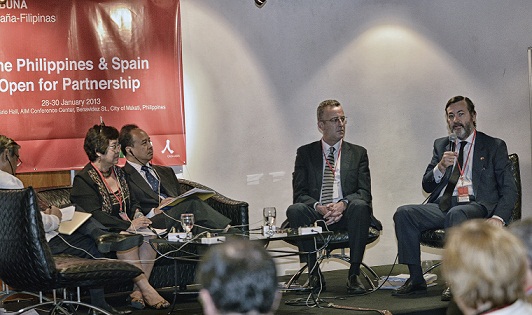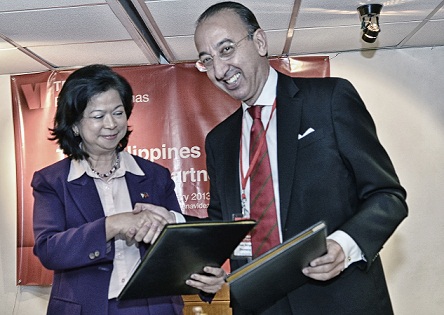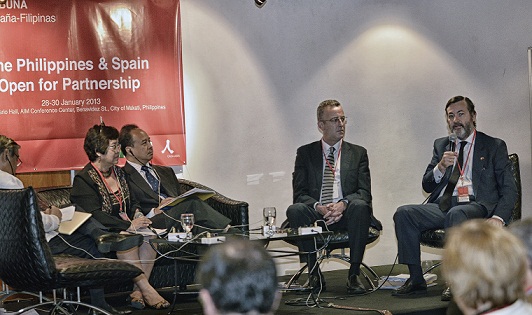By NORMAN SISON
Photos by ERIK C. LIONGOREN
 LATE last month, a Manila court sentenced activist Carlos Celdran to prison on charges of “offending religious feelings” for staging a theatrical protest in 2010 at the Manila Cathedral for the Roman Catholic Church’s opposition to a family planning bill that was then pending in Congress.
LATE last month, a Manila court sentenced activist Carlos Celdran to prison on charges of “offending religious feelings” for staging a theatrical protest in 2010 at the Manila Cathedral for the Roman Catholic Church’s opposition to a family planning bill that was then pending in Congress.
International human rights advocates and some netizens have blasted the landmark ruling, saying it potentially threatened the constitutional freedom of speech. “And what about the Catholic Church offending our sensibilities and intellect,” commented Anna May Hipolito on Facebook. “Can we also sue them?”
Other critics went further and said that it was reminiscent of the 300-year Spanish colonial period — a time when speaking out against the government and the Catholic Church merited a prison sentence and even death.
Indeed, it provided an ironic backdrop to an event across town in Makati City. On the day the verdict was handed down, the sixth edition of a Spanish-Filipino forum opened between diplomatic officials, academicians, tourism and cultural officials, and civil society members.
The January 28-30 Tribuna España-Filipinas took on an air of a reunion between a mother country and her estranged daughter.
There, Spanish delegates acknowledged their country’s errors during its days of empire but hoped for a renewal of ties between Spain and the Philippines as equals and build on the future. The envisioned the Philippines as Spain’s door to Asia, and Spain as the Philippines’ door to Europe.
Spanish officials pointed out that Spain, because of the economic recession there, has withdrawn aid to all Asian countries — except to its former colony the Philippines. Official development assistance from Spain reached 180 million Euros in the last five years.
“When the going gets tough, we always turn our eye on the Philippines in a very fraternal manner,” former Spanish defense minister Jose Bono told the forum. “Spain has a very selfless interest in the Philippines.”
Part of the reason is sentimental. “Your names, surnames, your very own history is our history,” Bono said.
“I have been here for two years now, but I have always felt very much at home. Not because the people are very nice, generous and open, but also beneath the surface, there are many aspects of our culture that many people in the Philippines and Spain do not know where they come from,” said Spanish Ambassador to Manila Jorge Domecq. “I think we will all benefit if we will all look at what we share from the past.”
 Filipinos are aware of Spanish influence in the local culture but do not think much of Spain. Instead, memories of the brutal Guardia Civil and venal Spanish friars, personified by the fictional Padre Damaso in Jose Rizal’s novel Noli Me Tangere, lingered since the Philippine Revolution.
Filipinos are aware of Spanish influence in the local culture but do not think much of Spain. Instead, memories of the brutal Guardia Civil and venal Spanish friars, personified by the fictional Padre Damaso in Jose Rizal’s novel Noli Me Tangere, lingered since the Philippine Revolution.
Published in 1887, Noli Me Tangere (“Touch Me Not” in Latin) depicted the iniquities of Spanish rule and Filipino society’s ills in unflinching candor. In 1891, Rizal followed up with a sequel, El Filibusterismo (“The Filibustering”), warning that a revolution would erupt unless reforms were introduced.
Among the major characters was Padre Damaso Verdolagas, an arrogant Franciscan friar who secretly sired a daughter, Maria Clara, the sweetheart of the protagonist, Crisostomo Ibarra, whose father was an enemy of Damaso.
The Catholic Church in Rizal’s day branded the novels as seditious and heretical, and they were outlawed. Literate Filipinos obtained copies that were smuggled into the Philippines.
However, Rizal’s novels made him a marked man. He was eventually executed on December 30, 1896, at the Luneta — Rizal Park today — for allegedly masterminding the revolution that broke out earlier that year.
In 1956, the nationalist senator Claro M. Recto introduced legislation making the Rizal novels required reading in high school, sparking vigorous opposition from the Catholic Church. Catholic schools threatened to close down if the bill was passed. Recto countered that they would be nationalized if they made good their threat.
Today, early copies of the novels are displayed at Fort Santiago in Intramuros, the original walled city of Manila, where Rizal was detained.
On September 30, 2010, Celdran, dressed as Rizal at his 1896 execution, entered the Manila Cathedral and held up a placard with “Damaso” on it near the altar during a service. He was promptly arrested and jailed. Celdran is currently out on bail and plans to appeal the guilty verdict.
Professor Flora Elena Mirano, dean of the University of the Philippines College of Arts and Letters, lamented that the case doesn’t help efforts between the Spain and the Philippines to revitalize ties. “It has opened up old wounds, old stereotypes that might not necessarily be true,” she said.
Spain has been reaching out since 1995, when King Juan Carlos I and Queen Sofia visited Manila, the first ever by a Spanish monarch since Ferdinand Magellan discovered the Philippines in 1521.
In 2011, the Spanish cultural center in Manila, Instituto Cervantes, honored Rizal on the 150th anniversary of his birthday with a recitation of his valedictory poem Mi Ultimo Adios (“My Last Farewell”).
Mirano offered Filipinos a way of looking at Spain’s reconciliation efforts. “It’s like in a family: you have a rift, you hurt each other, you leave, you’re separated,” she said. “But at a certain point you grow up.”
